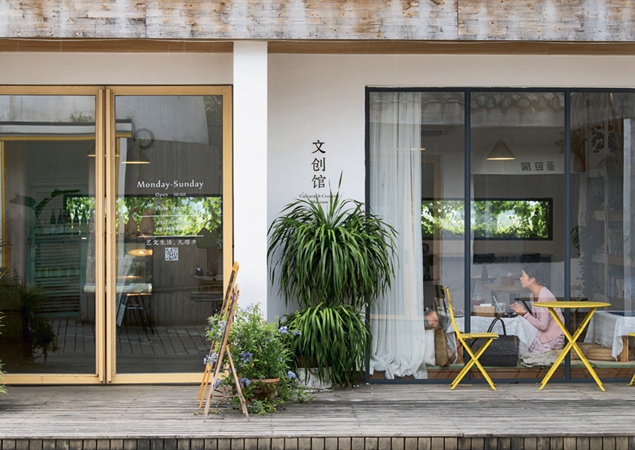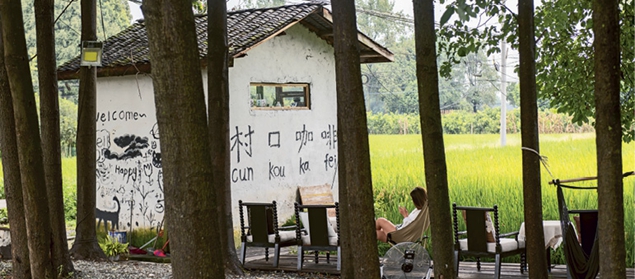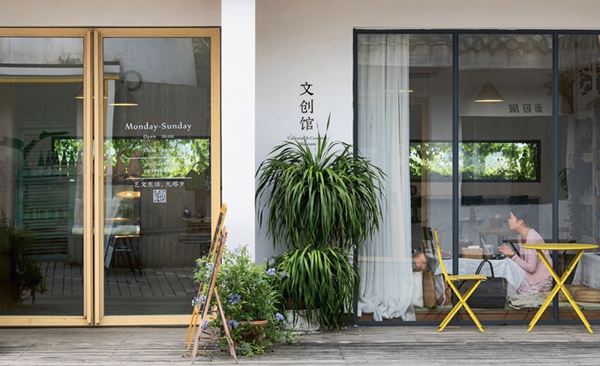A country teahouse in Baitou, Chongzhou (Sichuan)
In Chengdu, the harmonious marriage between “café” and “village” has created a new form of commerce that is both modern and dynamic. Over the past two years, the city has seen more than 8,000 village cafés flourish. The enchanting landscapes around these cafes attract city dwellers. The success of these establishments illustrates the rapprochement between young people and the countryside, reflecting the vitality of consumption and the economic resilience of Chengdu.
A pillar for tourism growth
Entering Chuanyin Art Valley, in the Shibantan district, one cannot miss the Qingrong Art Center, where a “giant panda” climbs a tree. This small courtyard with white walls and gray tiles is home to Sichuan’s first rural Starbucks.
According to Liu Changqing, founder of Qingrong Art Center, the uniqueness of this Starbucks lies in a more peaceful setting, where one can not only enjoy books in the library, but also read the picturesque landscapes of different seasons.
In 2022, Mr. Liu founded Qingrong Cultural Tourism Development LLC and signed a cooperation memorandum of understanding with the Han’e Community Collective Economic Organization in Shibantan. Together, they created a rural aesthetic framework promoting a new consumption model. Unlike busy urban business districts, the flow of customers is less in the countryside, making attracting customers a pressing issue. Starbucks also recognized the development potential of this region in the suburbs of Chengdu. The two parties agreed, and the first rural Starbucks in the province was born.
During the inauguration of this Starbucks, many villagers were curious and went there to taste the products offered. Most of them knew nothing about coffee and placed their order on the advice of the staff. Some villagers didn’t find the coffee very good, but that didn’t stop them from bringing their friends to check it out too.
For two years, this café has enjoyed thriving success, especially on spring and autumn weekends, when the parking lot and even the sides of the road are filled with cars. This success also stimulated other business activities such as camping, catering, guest houses, themed concerts and family farming activities. This type of multifunctional complex including a cafe, library, cultural and creative space, tea room, bistro and guest house revitalizes the development of cultural tourism in the village.
Building on the maturity of the coffee industry, the complex also offers courses to train professional baristas and promote the development of rural tourism.
In Tianxing Village, driven by the development model of village cafes, Baicao Xianglu Guesthouse was established. It includes a wellness salon, a medicinal cuisine restaurant and a rice field swimming pool, providing a picturesque setting and an idyllic life. These new attractions in Tianxing Village have created a new agricultural tourism business circle, which can also connect to other consumption places through a 27km agrotourism route in Xindu District.
As an essential fulcrum for the development of rural cultural tourism, the village café connects the countryside with the city, thereby achieving prosperity in all sectors.

A cultural and creative space in Shanquan Village, Longxing (Chongzhou), combines cultural and creative retail and cafe.
The popularization of coffee in peri-urban areas
After learning about the opening of a new village cafe in Dayi District, blogger Zhao Zimo went there to visit it. The cafe is located at the entrance of the village, surrounded by cornfields and rice fields, offering soothing greenery. If the rain hadn’t been there, she could have spent the whole afternoon there.
This minimalist-style café is distinguished by its white walls and green tiles, standing alone in the field. Some netizens joke that it looks like a raw building. Zhao Zimo ordered an Americano and an orange latte. Although she preferred medium roast beans, dark roasts were also acceptable to her. After all, she had not come just to taste the coffee, but above all to enjoy the pleasant environment.
What also impresses guests is the warm welcome of the establishment. Ms. Zhao, wanting to take photos, asked the staff for help. The two waitresses patiently helped her take several by making posing suggestions.
The manager of this café is a young woman born after 1995 who has already opened three village cafés in Dayi. Before 2023, she was still an ordinary employee. Last year, during the rapeseed flowering, looking at the small house surrounded by the sea of golden flowers, she decided to rent it and turn it into a cafe. At 27, she realized her dream of managing a café. This year, she invested another 10,000 yuan to revamp the cafe, which quickly became popular, and later opened a third location.
In each of its coffees, there is a distinctive personal touch providing consumers with unique emotional value. The slogan of his first café is “Come as a friend, drink with emotion and live a good life”. The second, for its part, displays a banner stating: “Let the whole village drink coffee!” », an objective actually achieved. Because we often see elderly people, sitting opposite each other, drinking coffee while chatting.

A small café at the entrance to a village on the road from Anchu to Dayi (PHOTOS: HAN JIE)
In a short time, the village cafe sector in Chengdu has seen remarkable growth. Whether in terms of environment, food, or distinctive services, certain establishments are starting to stand out.
Shuye Cafe in Jintang District, for example, is located in a treehouse with a rich sense of design. A spiral staircase rises along the trunk of a tree outside, while the interior features retro decor. Sunlight penetrates through the layers of foliage, creating a soft and pleasant ambiance.
There is also Jungle Jungle Coffee in Dayi, which stands out for the unique experience of drinking coffee in the valley. The café not only offers Thai snacks and hotpots, but also professional outdoor Thai massages. Other services are also available: collars, drinkers and poop scoops for pets, as well as charging stations in the parking lot. Even in the city these services are considered special, so imagine in the countryside.
The wave of village cafes in Chengdu is inseparable from the democratization of this drink in recent years and the strong associated culture. The 2023 Chinese Cities Coffee Development Report shows that Chengdu’s coffee sector has developed rapidly, ranking second in the country in terms of the number of independent coffee shops in 2022, second only to Shanghai. Coffee has become part of the daily lives of Chengdu residents, and the village cafe illustrates the strength of youth in rural revitalization.
*LI CUIHUA is a journalist at Chengdu Culture.








